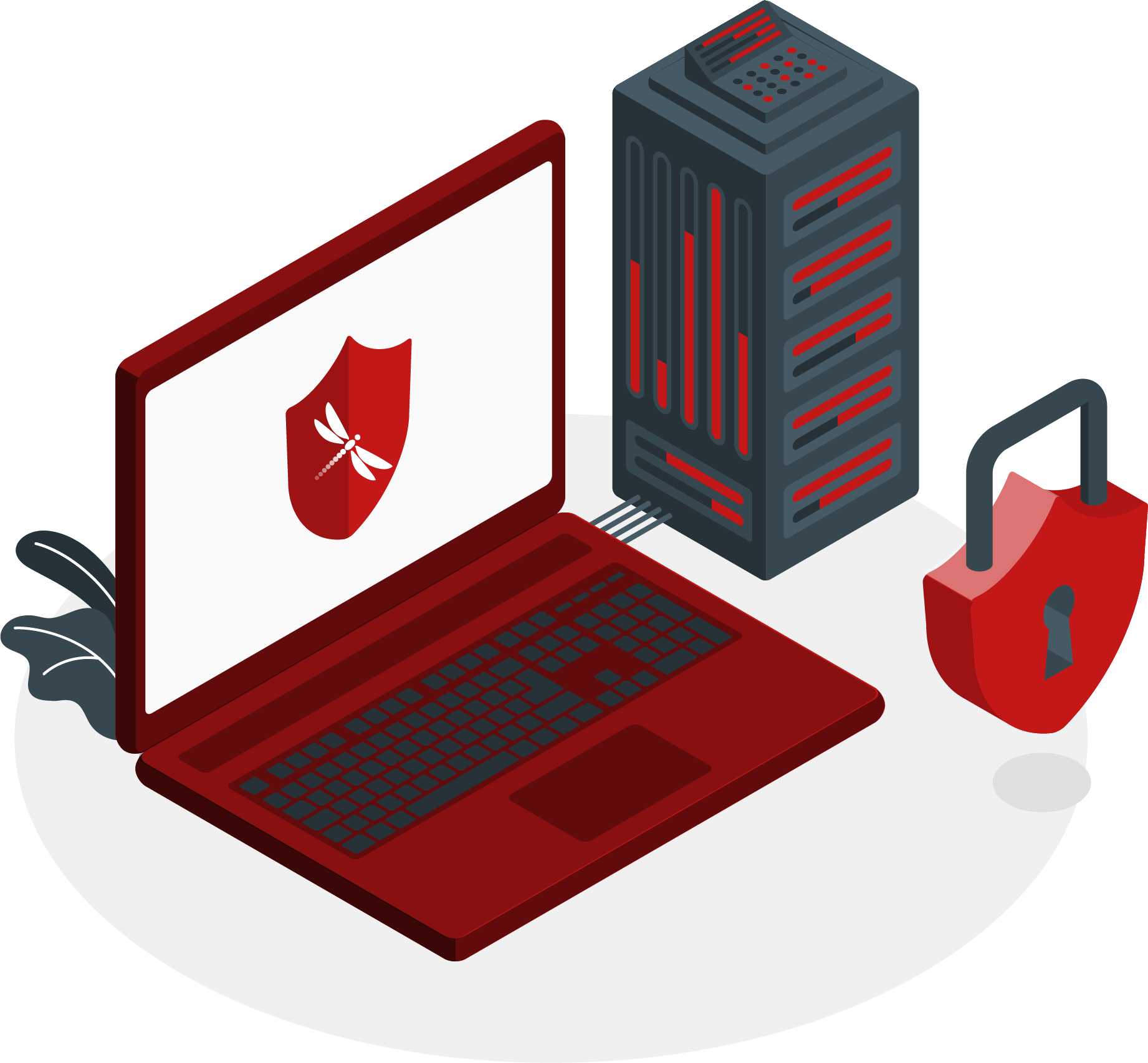Penetration testing: typical benefits & preventing cyberattacks
Cyber attacks are becoming increasingly frequent and sophisticated, exposing companies to high risks of breaches of their sensitive data. To avoid this, penetration testing is an essential tool for assessing the security of your IT system.
Penetration tests, also known as pentests, are computer security assessments used to determine the vulnerabilities of a system or network. Intrusion testing can be carried out in a number of ways, depending on the company’s needs and objectives
Intrusion tests can be carried out on a one-off or recurring basis, to guarantee constant security. Using a pentest as a service can offer a more cost-effective and standardized approach to such testing.
In this article we take a look at computer security assessment through penetration testing and its role in identifying vulnerabilities & security holes.

Why is penetration testing so important?
The advantages of penetration testing are numerous, as it enables security flaws to be detected before a malicious actor discovers and exploits them. By identifying vulnerabilities and potential risks, penetration testing helps to improve the security of IT systems and reduce the risk of attack.
Penetration tests also enable you to assess a system’s resistance to a real attack, so you can identify areas of weakness and strengthen your system’s overall security. They also enable compliance with IT security regulations, especially for companies handling sensitive or confidential data.
On the other hand, the absence of penetration testing can have a significant impact on your company’s business, by making IT systems more vulnerable to external or internal attacks through access to confidential data, and exploiting it for malicious purposes.
Failure to carry out penetration testing can also render a company non-compliant with IT security regulations, leading to potentially significant financial penalties.
The different types of pentest
External Pentest :
External pentesting is carried out from outside the company, simulating a hacker attack. Hackers seek to exploit system vulnerabilities accessible via the Internet.
Their goal? detect potential vulnerabilities that could be used by attackers to penetrate the system. External pentesting is useful for identifying weak points in your company’s Internet security.
Internal Pentest :
Internal pentesting is carried out from the company’s internal network, simulating an attack from a malicious employee or a user with access to certain parts of the system.
Testers try to determine whether vulnerabilities can be exploited from the internal network. Internal pentesting is essential to assess your company’s resilience against attacks from malicious employees or unauthorized users.
Application Pentest :
Application pentesting is designed to assess the security of web or mobile applications developed by your company.
Testers try to discover vulnerabilities that could be exploited to penetrate the application. Application pentesting is useful for detecting security flaws in your applications before attackers exploit them.
Pentest IoT :
IoT pentesting is a specific security assessment for connected objects (IoT) such as surveillance cameras, thermostats or smart lights. Testers try to discover vulnerabilities in hardware, firmware and communication protocol.
IoT pentesting is useful for identifying potential weaknesses in your company’s connected objects.
Pentest mobile :
Mobile pentesting is a specific penetration test for mobile applications developed by your company. Testers seek to identify security flaws in mobile applications on different platforms such as Android or iOS. Mobile pentesting is useful for detecting vulnerabilities in mobile applications before they are exploited by hackers.
Why is penetration testing so important?
The advantages of penetration testing are numerous, as it enables security flaws to be detected before a malicious actor discovers and exploits them. By identifying vulnerabilities and potential risks, penetration testing helps to improve the security of IT systems and reduce the risk of attack.
Penetration tests also enable you to assess a system’s resistance to a real attack, so you can identify areas of weakness and strengthen your system’s overall security. They also enable compliance with IT security regulations, especially for companies handling sensitive or confidential data.
On the other hand, the absence of penetration testing can have a significant impact on your company’s business, by making IT systems more vulnerable to external or internal attacks through access to confidential data, and exploiting it for malicious purposes.
Failure to carry out penetration testing can also render a company non-compliant with IT security regulations, leading to potentially significant financial penalties.
How does an intrusion test work?
1) Preparation
Before starting a penetration test, it’s important to define the objectives and attack scenarios to be simulated. It is also essential to define rules of engagement to ensure that testing does not interfere with the company’s day-to-day operations or cause damage.
2) Information gathering
Gathering information is an important step in a successful penetration test. It involves gathering information on the targeted system, network or application, as well as on the company in general. This may include researching public information about the company, such as its organizational structure, technology infrastructure and suppliers, as well as gathering information about the systems and applications used by the company.
3) Vulnerability analysis
Once all the information has been collected, the penetration testing team can proceed with a vulnerability analysis. This analysis is carried out using automated and manual tools to identify security vulnerabilities on the targeted system, network or application.
4) Exploiting vulnerabilities
Once vulnerabilities have been identified, the penetration testing team can attempt to exploit them to gain access to the targeted system, network or application. This step is carried out with great care to avoid damage to the system or application.
5) Report and recommendations
Once the penetration test is complete, the penetration test team prepares a detailed report on the results of the evaluation. The report includes a description of all identified vulnerabilities, as well as recommendations for correcting them. The report can also include recommendations for reinforcing existing security mechanisms and advice on how to improve the company’s security practices.
The benefits of intrusion testing as a service
Penetration testing is an important step in guaranteeing the security of a company’s information systems, and a crucial one in defining your cybersecurity roadmap. However, their implementation can sometimes prove complex and costly, especially for SMEs that don’t always have the resources to carry out regular security assessments.
That’s where penetration testing as a service comes in. These services offer a turnkey solution for intrusion testing, without the need for the company to invest in specialized equipment and skills. But what are the concrete benefits of such a service?
Access to specialized expertise :
Intrusion testing as a service services are generally offered by specialist cybersecurity companies with high-level skills and certifications. Customers therefore have access to IT security experts, able to identify potential vulnerabilities and threats.
Cost savings :
Penetration testing as a service is often offered on a subscription basis, enabling customers to significantly reduce costs compared to purchasing on-premise solutions. What’s more, these services can be tailored to the company’s specific needs, resulting in additional cost savings.
Speed and efficiency:
Intrusion testing as a service services are often completed in a matter of days or weeks, offering a fast and efficient solution for companies requiring rapid results. What’s more, these services are often standardized, guaranteeing consistent quality and consistency in assessments.
Flexibility :
Penetration testing as a service can be carried out remotely, allowing great flexibility in terms of customer location and access to the systems to be tested. Tests can be carried out on a wide range of systems and devices, including web applications, networks, servers, IoT and mobile devices, and more.
Compliance :
Intrusion testing as a service often complies with the most stringent IT security standards and regulations. This enables companies to ensure that they comply with regulatory security requirements, which can reduce the risk of fines and sanctions.
Conclusion:
Penetration testing is essential to guarantee your company’s security. By using the different types of pentesting available and opting for a penetration testing as a service, you can effectively protect your IT system against cyber attacks.
For further information or to request an intrusion test, please contact us.
Intrinsec, our business? protect your own!
Intrinsec, a pure-player in cybersecurity in France for over 28 years, is one of the leading players in its field.
Drawing on its long-standing expertise in assessment, Intrinsec adapts to the needs and challenges of its customers, in order to face up to increasingly sophisticated threats, by offering tailor-made support through a broad range of cyber assessment services, including penetration testing (pentesting), cybersecurity audits, Red Teams, Trophy Hunters and Purple Teams.
Intrinsec is also at the forefront of the assessment business in France, with expertise recognized by its numerous qualifications, including
PASSI RGS (attestation n°20007) and PASSI LPM (qualification decision n°5685)
for its organizational and physical audit, configuration, architecture, source code and penetration testing activities.
The safety and protection of your business are our core concerns. That’s why Intrinsec is committed to providing quality services and guaranteeing optimum protection for your information system.


